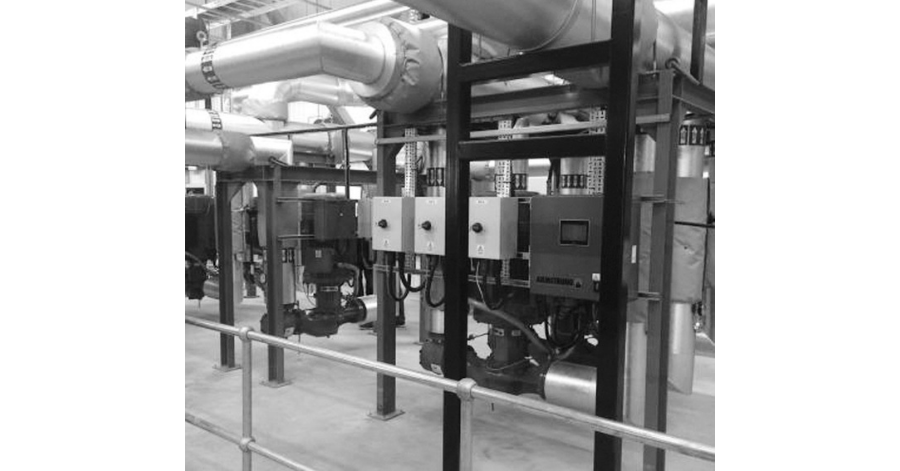Blackburn Meadows, Sheffield
An important district heating scheme in Sheffield, which generates heat and energy from waste wood, has come to fruition with the help of an integrated packaged pump solution from Armstrong Fluid Technology.
The pump solution incorporates six large Armstrong 4300 Series variable speed pumps with built-in inverters, integrated with Armstrong’s IPS 4000 pump controller, which optimizes the operation of all 6 pumps to minimize energy consumption.
When planning the pump house for the district heating scheme, RK District Heating Limited had a number of priorities. The pumping requirements for the scheme are complex and involved the handling of water at high maximum temperatures (up to around 115°C). The plant needs to offer outstanding levels of energy efficiency across a wide range of operating conditions, as the district heating scheme is being expanded incrementally over time.
In addition, the demanding timescales for the project meant that the equipment needed to be installed within shorter than average lead times.
At the heart of the system are six Armstrong 4300 DE variable speed pumps integrated with Armstrong’s IPS 4000 pump controller. The variable speed pumps incorporate onboard inverters which enable them to respond instantaneously and automatically to changing requirements, adjusting their motor speeds and drawing only the power required to meet the load.
As they are Armstrong Design Envelope models, they also provide energy-efficient operation across a wider operational range than other pumps, providing flexibility to adapt in the future without the need for replacement or system over-sizing.
The pumps are controlled by the Armstrong IPS 4000 which calculates how best to meet demand and automatically manages pump operation accordingly.
The IPS 4000’s advanced control technology ensures that pumps are operated at their most efficient points at all times, and are phased in and out in the best possible configurations to deliver the required capacity. By treating the system holistically, and balancing supply across all 6 pumps, the IPS 4000 is able to achieve levels of efficiency that exceed those made possible by less sophisticated capacity-based control methodologies.
As the biomass-based district, the heating scheme has a particularly wide range of operating scenarios, the advanced control made possible by the IPS 4000 ensures that energy efficiency is optimized whatever variations may occur.
 In the future, as additional plant rooms across Sheffield are integrated with the district heating scheme, the IPS 4000 will ensure that the pumps adapt to accommodate the changing requirements whilst still maintaining optimum energy efficiency.
In the future, as additional plant rooms across Sheffield are integrated with the district heating scheme, the IPS 4000 will ensure that the pumps adapt to accommodate the changing requirements whilst still maintaining optimum energy efficiency.
The additional flexibility and sophisticated control provided by the Armstrong pumps and IPS 4000 controller means that the energy wastage associated with over-sizing of systems is avoided.
The specification of integrated pump solutions from Armstrong Fluid Technology also had significant advantages in that it harnessed the benefits of off-site manufacture. Instead of being constructed in the traditional way (with components being delivered individually and assembled on-site) the integrated pump solution was assembled, integrated, and tested off-site, at Armstrong’s purpose-designed factory in Halesowen.
The completed pump solution was supplied to the site ready-assemble just requiring a final connection. Off-site manufacture ensured that all components for the pump solutions were connected and integrated exactly as required, maximizing control over the final quality of the systems and ruling out the risk of errors.
Using this approach, the timescales for delivery of the project were also reduced significantly, with the assembly of the packaged plant able to progress concurrently with on-site construction, unaffected by adverse weather or other potential delays.
“I have had favorable experience of Armstrong’s work in the past and had no hesitation in specifying them for this project.”
David Forrest
Project Manager
RK District Heating





Comments